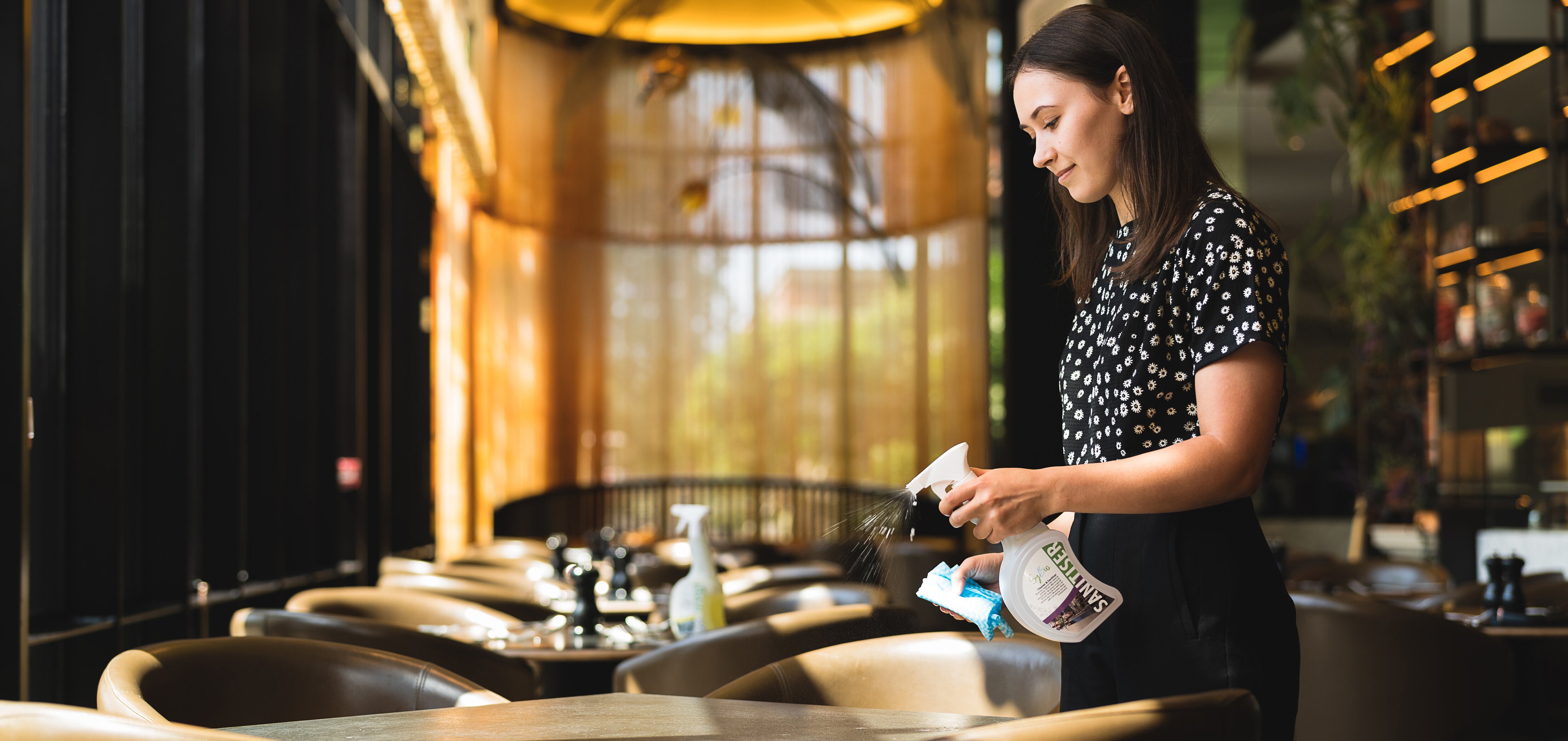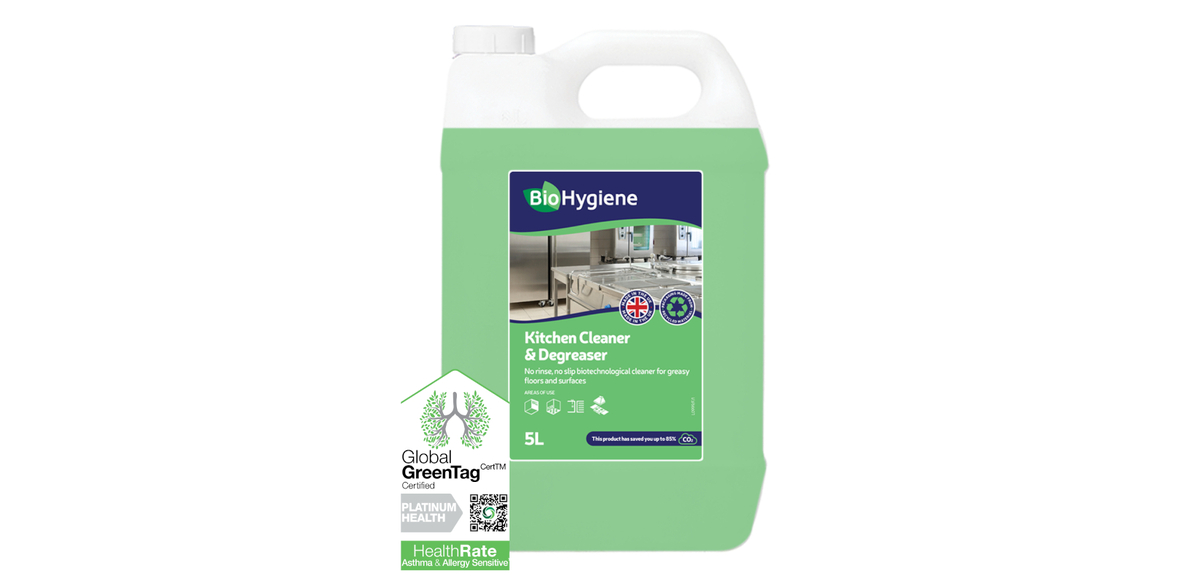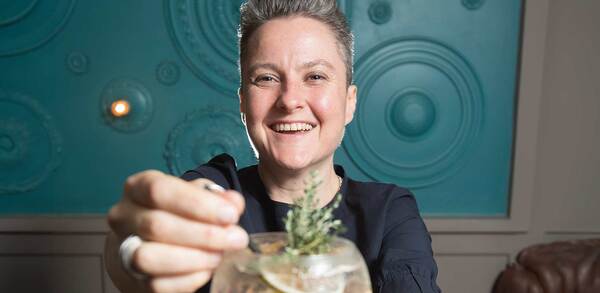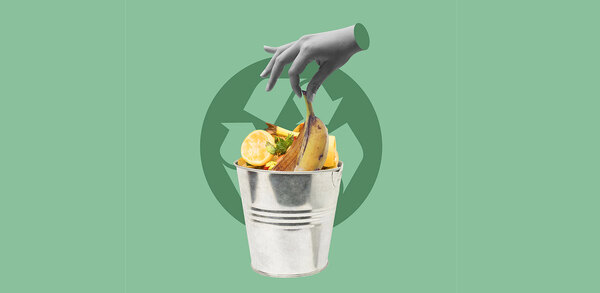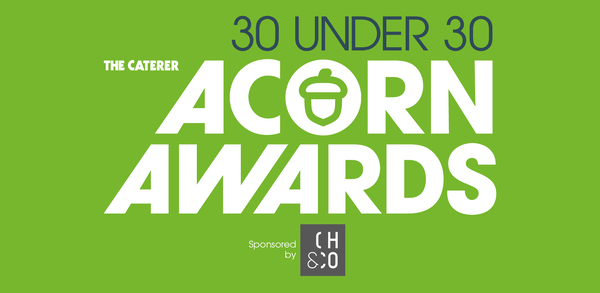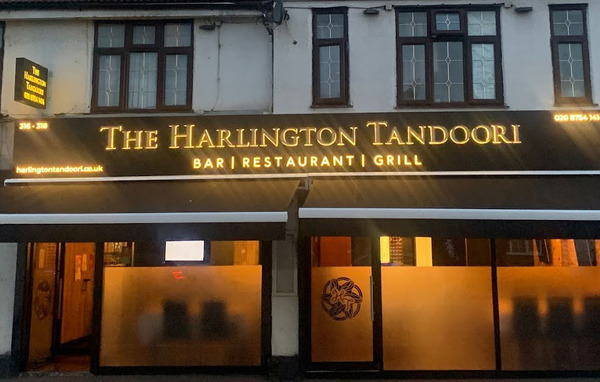Catch the bug with plant-powered cleaning products
Deep-cleaning doesn’t mean hours of scrubbing – the new generation of biology-based solutions can kill germs with super-efficient plant power. Angela Frewin reports
US humorist Will Rogers famously observed: “You never get a second chance to make a first impression,” and this has always been true when it comes to cleanliness and hygiene in hospitality.
Research by P&G Professional has found that 32% of respondents would never return to an establishment where the cleanliness and hygiene were not up to scratch on the first trip. Meanwhile, public awareness of the Food Hygiene Rating scheme, or Scores on the Doors, has grown from 47% in 2020 to 58% in 2023, according to the Food Standards Agency’s ‘Food and You’ survey.
Stelios Theocharous, managing director at ingredient and cleaning solution supplier Ceres, says: “Since the Covid pandemic, guest expectations around cleanliness and hygiene when dining out or staying over have soared. Add to this the increasing review culture, where guests are quick to jump onto platforms such as TripAdvisor to vent any frustrations, and operators who scrimp on cleaning will very quickly find that it’s not just their venues that are tarnished, but their reputations too.”
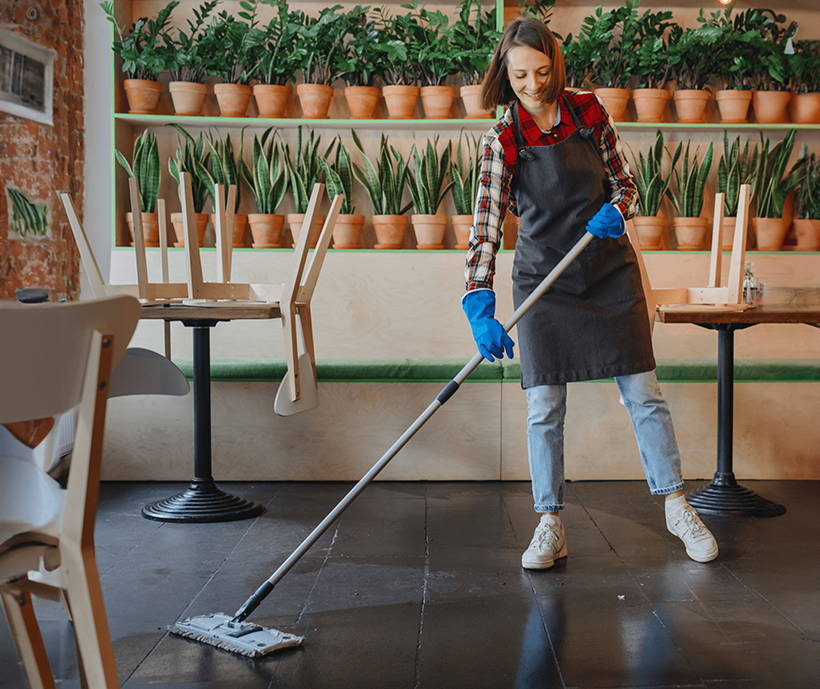
Meeting these expectations has never been tougher. As Dan Francis, head of channel at biotech cleaner manufacturer BioHygiene, says: “Hospitality leaders are already facing more challenges than any other industry, thanks in part to the cost of living crisis reducing demand as well as rising costs and staff shortages. But on top of that, the cleaning pressures that society demands in this post-pandemic world are greater than ever.
“While those in hospitality need to adhere to heightened cleaning pressures with a limited labour force, they must also adhere to the global demand for sustainable business practices. Customers, industry certifications like [environmental and sustainability body] Green Key and legislative requirements all are pushing for those in hospitality to quickly implement highly effective and sustainable cleaning technologies.”
The Covid scare unearthed a raft of easily overlooked high-traffic touchpoints, from light and lift switches to menus and condiment pots, and underlined how the smallest lapse could taint customers’ views of a venue’s overall cleanliness.
Technologies such as hygiene-related workflow management programs and apps can help operators draw up and implement detailed cleaning protocols for each area. They guide staff on what to do and how frequently, while keeping managers in the loop.
Grease lightning
P&G Professional’s UK and Ireland country sales lead Berat Onur says: “Regular deep-cleaning is a necessity in today’s competitive market, where cleanliness is key to long-term success. Using simple yet highly effective professional products means the deep-cleaning process requires minimal training.”
As basic cleaning requires detergents and degreasers to remove grime and disinfectants to curb pathogenic microbes, choosing multipurpose products can help simplify the process while saving time and money. For instance, P&G’s Flash professional disinfecting degreaser spray will clean, de-grease and disinfect surfaces “eliminating the need to switch between different products for various tasks” according to Onur.
Meanwhile, Ceres has developed a trio of fast-acting cleaners that are natural and non-caustic because, says Theocharous: “Being green and clean will win more favour with guests.” They include a cheap, non-toxic ‘old-school’ solution – aluminium-free bicarbonate of soda – to neutralise bad odours in hotel rooms and toilets and remove stains from bed linen – along with two powdered de-greasers.
The de-greaser tackles floors, work surfaces, walls, ovens, fryers, utensils and pans as well as stained clothing and cloths, while the deep-fryer cleaner eliminates carbon build-up, polymerisation and grease from frying ranges, standalone fryers, tabletop fryers and other equipment without stripping the metals’ natural protective layer. Theocharous advises deep-cleaning fryers at least every three months to preserve their efficiency and the freshness and lifespan of cooking oil.
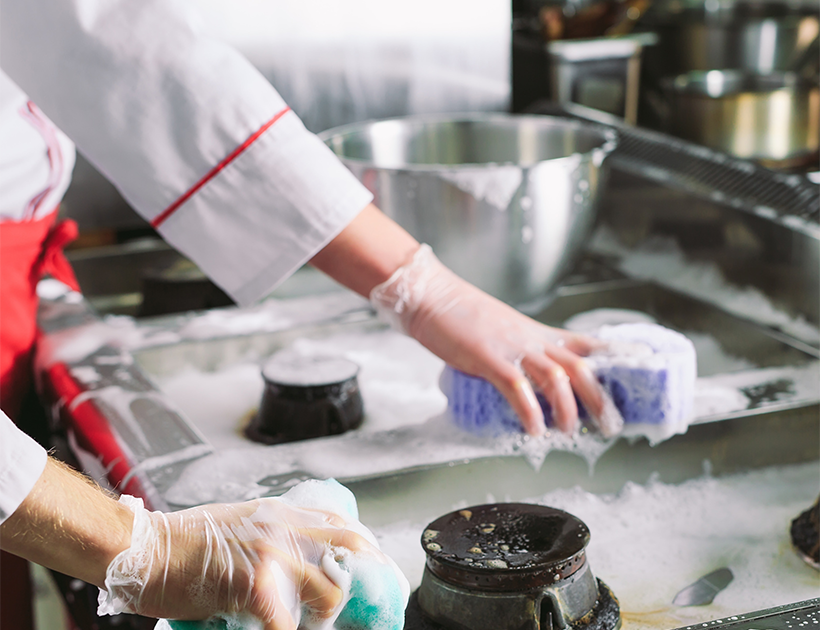
BioHygiene’s Francis blames the mistaken belief that greener solutions can’t be as powerful or cost-effective as traditional harsh petrochemicals for hindering many operators’ sustainability ambitions. Its eco-friendly, highly concentrated biotech cleaners (which cover the kitchen, washroom, laundry, hand care, general and specialist categories) use microbes, enzymes and natural plant derivatives for a deep, effective clean in hard-to-reach cracks and grouting, leaving a protective residual biofilm that reduces the need to clean as frequently.
“Our scientists analysed hundreds of bacteria strains, identifying those with the most effective enzymes,” says Francis. Being kinder to people and the planet also minimises the rigours of complying with Control of Substances Hazardous to Health regulations.
Other innovative green alternatives include 2San’s Clean Zero: water that has been re-engineered via a seven-stage filtration system that can remove 99% of bacteria from all water-washable surfaces, including fabrics.
Another example is Micro-Fresh’s hypoallergenic, anti-microbial solution, which uses positively charged ions to curb the growth of odour-causing bacteria, viruses and fungi to keep fabrics and surfaces fresher and hygienic for longer. It is used in a fabric additive, a laundry liquid and in the two-step Home-Fresh mould remediation kit, which can be sponged once a month onto walls and soft furnishings to eradicate and protect against mould. The pandemic spurred new applications of the solution as a hand sanitiser and a remotely activated portable sanitising fog generator that disinfects a room in minutes and protects surfaces, soft furnishings and textiles for up to 30 days.
Machine thinking
Kitchens require especial attention to keep food-borne illnesses at bay, but appliances equipped with intelligent self-cleaning programs can help take the heat off kitchen staff and cut cleaner and water consumption.
Julian Fisher, head of marketing at catering spares specialist Parts Town UK, says: “Build-up of grime, starch and grease on professional kitchen equipment can cause unplanned maintenance costs and additional stress on important parts responsible for equipment functionality. That’s why regular cleaning cycles are key to dramatically reducing the time between engineer intervention and equipment downtime.”
Manufacturers’ own cleaning solutions are designed to work with their specific cleaning systems and schedules, and can safeguard manufacturer warranties by avoiding potential damage from other cleaners, advises Fisher. For instance, Merrychef oven cleaners allow everyday cleaning of Connex and Eikon ovens without the risk of abrasion, while Hobart’s hygiene tablets deep-clean its glasswashers and dishwashers after every 1,500 washes to remove grease and starch that leave lingering smells and residue.
Nick Falco, product and technical director at Mechline, says: “Regular and thorough staff training is key for ensuring hygiene and food safety standards are kept high. But no matter how well staff perform their day-to-day cleaning duties, these can only offer a temporary solution. If you consider, for example, that a single bacteria cell can multiply to over eight million in just eight hours, it is crucial that caterers look at investing in supporting systems that help maintain good hygiene control to complement staff best practices and minimise the risks of viruses and bacteria spreading.”
Mechline’s compact, wall-mounted HyGenikx air and surface sanitisers are suitable for food prep areas, coldrooms, front-of-house and washrooms. The sanitisers use germicidal UVC (ultraviolet-C) technology to create superoxide ions that zap bacteria and viruses, neutralising bad smells, such as stale beer in cellars, and extending the shelf life of perishable foods by 58%.
QR code stickers inform customers of the units’ round-the-clock invisible protection because, adds Falco: “It’s good for people’s wellbeing to know that as a businessyou go the extra mile.”
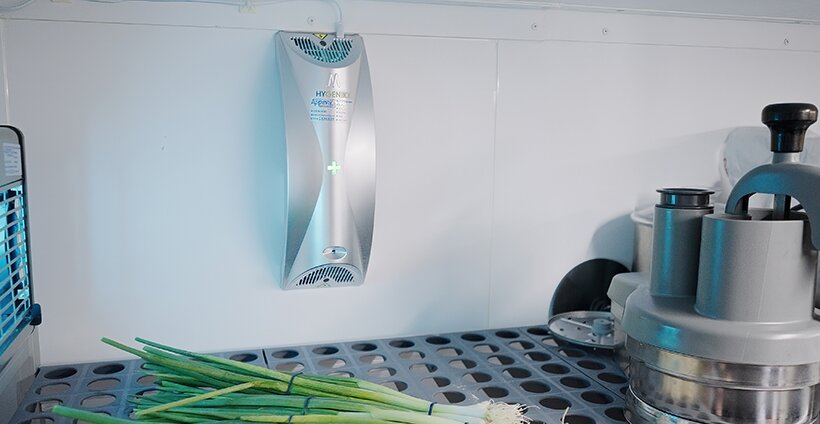
Burger & Lobster goes green with plant-based cleaning
Improved hygiene, service and price were key considerations when Burger & Lobster chose Sybron to supply its nine London restaurants with its SyBio cleaners, developed in partnership with BioVate Hygienics as a powerful, safe, sustainable and cost-effective solution.
SyBio says its combination of probiotics, enzymes and plant derivatives contains 30 times more actives than its biotech rivals. It cleans, disinfects and protects surfaces from dirt and pathogens for 30 days via a residual layer of friendly bacteria. The range is small and multipurpose to streamline cleaning and reduce plastic container use and storage, and the controlled dosing system ensures optimal results at the right cost.
Burger & Lobster managing director Dino Sura says: “The environmental aspect of Sybron’s products was a huge benefit and the other aspect was whether we were saving money, which we are. Sybron is the only supplier to tell us that prices have gone down.”
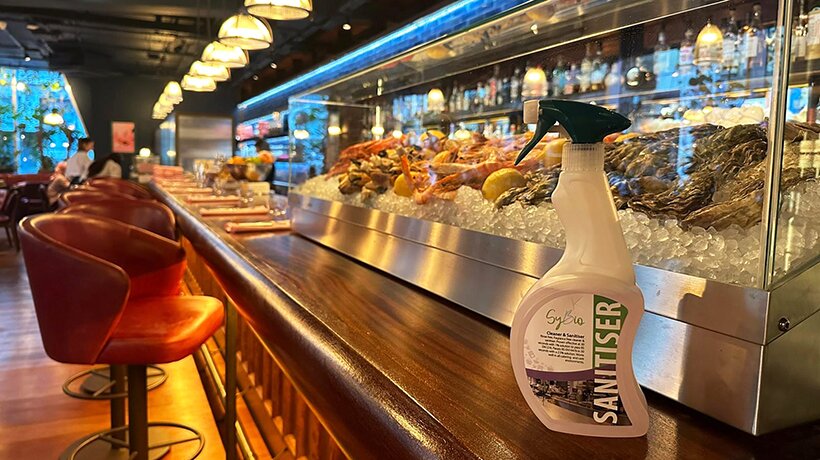
George Mason, sales and marketing director at Sybron, says: “As our market shows signs of stability, our team is working extremely hard behind the scenes to ensure that falling prices are passed on.”
Sybron offers a service and support package that includes a training academy, regular meetings and monthly updates, and direct engagement with general managers and head chefs, who have their own WhatsApp group.
Ahmed Oubaha, head chef at Burger & Lobster’s Threadneedle restaurant, says: “Sybron is part of the Burger & Lobster family and has consistently been available and responsive in addressing our needs.”
Chopping the plastics
Contrary to common belief, plastic chopping boards are not more hygienic than their wooden counterparts and can pose a health hazard to diners, warns No Mise En Plastic, an online resource encouraging chefs to eliminate single-use products and cut kitchen waste.
Research from North Dakota University found plastic boards to be a significant source of restaurant food contamination from microplastics, which have been linked to intestinal inflammation, allergic reactions, cancer, heart disease and poor foetal development.
No Mise En Plastic founder Jack Feeny says: “As well as concerns about microplastic deposits, we know that most plastic chopping boards end up in landfill, rather than being properly recycled. And as chefs will testify, these boards quickly gain deep knife grooves, which are perfect for harbouring bacteria.”
Woods such as beech and oak have natural anti-microbial properties and are, says Feeny, kinder to knives than some plastic boards and live longer: “A well-maintained wooden chopping board can last for many years in the kitchen, and with occasional sanding and treatment, can be refreshed.”
To care for wooden chopping boards, chefs should scrub them with hot soapy water and porous-surface sanitisers (with a PH between four and 10), use salt washes to remove high-risk food debris and apply a food-safe oil to the surface weekly.
Suppliers
2San www.2san.com
BioHygiene biologicalpreparations.com/biohygiene
Ceres www.ceres.shop
Mechline www.mechline.com
Micro-Fresh www.microfresh.com
No Mise En Plastic www.nmeplastic.com
P&G Professional pgpro.co.uk/en-gb
Parts Town UK www.partstown.co.uk
Sybron www.sybron.co.uk/sybio



